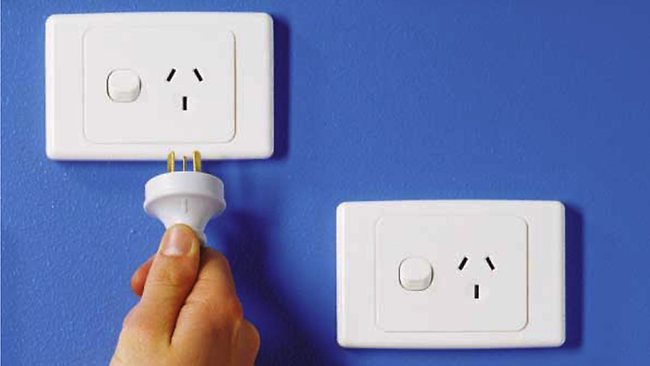
50 ways to save on power bills for the Over-50s
Every dollar counts for Australians faced with skyrocketing power bills, so it’s vital to have your home running as efficiently as possible. 
Stuck for ideas on how to save? Never fear, The FiftyUp Club has chosen 50 great ideas to help you keep your power usage - and electricity charges down without having to go cold this winter.
1. Join the FiftyUp Club! We've unlocked new, group-discounted deals which are available for a limited time only. These offers are exclusive to our members, but anyone can join the FiftyUp Club, cost and obligation free. Click here to see the current offers.
2. Switch retailers! Some Australian households can save hundreds in just a few minutes by shopping around.
3. Get retained. Sometimes when you’re just about to leave, your electricity retailer will discover a better offer for you. Funny about that …
4. Dial the heater down. Men are most comfortable at about 22 degrees and women at about 24 degrees. So start at 19 or 20 in winter and see if it’s comfortable.
5. Put on panels. Solar panels can still cut your costs if you use energy during daylight hours. Then use your appliances during the day, that way they will run for free.
6. Choose window coverings and double-glazing. This will help keep a consistent temperature and, in turn, help reduce your power bills.
7. Avoid “Vampire power”. Save about 10 per cent by turning appliances off at the power point when not using them.
8. Count the Stars. A 3-star fridge/freezer can be $900 cheaper than a 1-star appliance over the life of the machine.
9. Use pots and pans with snug-fitting lids. That way pans will heat up more quickly when covered.
10. Opt for energy-efficient CFL or LED light globes over incandescent globes. Some of these bulbs are also dimmable! If you’re stuck for ideas the Light Bulb Saver App has handy tips about the best bulbs and right lighting for every room in the house.
11. Don’t overheat your water. Try 50-60 degrees. Every degree there saves about 1 per cent of your water heating cost.
12. Join The FiftyUp Club! We use the buying power of over 270,000 Australians to get group discounts from providers at www.fiftyupclub.com.
13. Or do it yourself. If you prefer, you can see every offer on the open market at the government site energymadeeasy.gov.au
14. Join a hardship program. All retailers have them. If you’re struggling, ask them for relief.
15. Find out if you’re eligible for energy concessions. State Governments have a few concessions to help the most needy with their power bills, but rebates and eligibility conditions vary from state to state. Google ‘Energy rebates and concessions in [insert your state here]’.
16. Take shorter showers. Did you know showering can make up to 60 per cent of your hot water usage?
17. Take advantage of government rebates for greenhouse efficient hot water systems.
18. Switch off lights in those rooms that aren’t being used. It may seem a very obvious move but it’s something we’ve all been guilty of it!
19. Connect to gas. Natural gas can prove to be a cheaper way to heat your home and is well worth investigating.
20. Get insulated! Ceiling and floor insulation will keep heat in during winter and out in summer.
21. Remember, time is money. Use timers to control heaters.
22. Don’t be slack and leave on heating and cooling appliances if you don’t need them.
23. Limit household activity to one or two rooms. Only heat the spaces in your home that you are using, rather than the whole house.
24. Draught-proof your home with draught- stoppers, door snakes and window sealing tape.
25. Keep your windows and doors closed and draw the curtains at night to help keep the heat in.
26. Put a jumper on! Dress for the season and you won’t need as much heating or cooling in the first place.
27. Buy a hot water bottle! They’re super cheap and super handy. Just pop it into your bed an hour before you jump in or wrap it in your PJs for extra warmth!
28. Run slow-moving ceiling fans in reverse to help push the hot air back down to where it is needed most.
29. Install a thermostat you can program yourself. This allows you to set timers for the temperature in your house.
30. Ditch the beer fridge. They tend to be older and therefore less energy efficient, and can chew through more than $250 a year.
31. Can’t do without it? Then just turn the Beer Fridge on a few hours before your big event.
32. Check your seals and replace if damaged. A broken seal is the same as leaving the door open!
33. Place the fridge in a well-ventilated position and allow sufficient gap at the top and around the sides of the fridge, away from direct sunlight or any source of heat.
34. Cook large amounts in the oven and freeze them for the week. Using a microwave is more energy efficient and cheaper to run than an oven when reheating food.
35. Replace damaged coils and reflectors. Clean the reflectors for full heating benefit.
36. Keep your oven serviced. Keep the seals tight and oven clean to ensure no heat is wasted.
37. Clean the filters on the rangehood regularly. Vent the exhaust to outside your home and use the exhaust fan on the lowest speed.
38. Watch the weather. Some appliances work more effectively than others depending on climate. Head to energyrating.gov.au to compare product types and brands.
39. Stack the dishwasher and don’t run it until it’s completely full, then connect it to cold water.
40. Electric fan-type ovens are more efficient than conventional ovens.
41. Get gas or solar hot water. It uses less power than electrical hot water services.
42. Did you know? Households that install a small-scale renewable energy system (solar, wind or hydro) or eligible hot water system may be eligible for a benefit under the small-scale Renewable Energy Scheme (SRES) to help with the purchase cost. For more information visit http://yourenergysavings.gov.au/rebates/renewable-power-incentives
43. Shift your usage. Save about $260 a year by using washing machines, dishwashers or heating during off-peak times.
44. Ditch the dryer and spin dry before hanging out a load. It may take a little longer but it will save you a lot of money!
45. Fill in your backyard swimming pool! A pool pump can cost anywhere from $600 to $1500 a year to run and a spa costs about $240.
46. Rather not? Then run the pool or spa at night on an off-peak tariff or controlled load meter to minimise cost.
47. Give your appliances a staycation! Turn them all off for a day and read a book.
48. Use a powerboard with separate switching and turn it off when not in use.
49. Use timeout devices for all non-essential appliances e.g. televisions so that the power is cut to the appliance when it is not being used.
50. Take up the Medical Heating and Cooling Concession. Check the scheme on your state government website to see if you are eligible for the concession.
Joel Gibson, campaign director at One Big Switch joined Kayley Harris and Sam Stove on the Daily Drive recently to share his top tips for saving on your energy bill. Have a listen here:


